The most heavenly campgrounds for stargazing in Florida have dark skies in lonely places, well away from the ambient light of populated areas, and it’s a better experience if you can camp overnight under the stars.
Skies are darkest with the “new moon,” which actually means no moon, allowing the galaxies to shine.
The week of April 2-8, 2024 is International Dark Sky Week, intended to raise awareness about light pollution. Two parks in Florida are certified “dark sky places” by the International Dark Sky Association:
- Kissimmee Prairie Preserve State Park, 30 miles north of Lake Okeechobee, and
- Big Cypress National Preserve in the heart of the Everglades.
But we recommend a dozen great campgrounds across Florida where you can pitch a tent and enjoy Florida’s dark skies.
#DarkSkyWeek #DiscoverTheNight

Night Sky Map. This link will take you to www.timeanddate.com/astronomy/night/ where today’s map of your local night sky will be displayed with viewing times for visible planets and constellations, depending on your web browser’s location settings.
2024 New Moons for darkest skies
International Dark Sky Week is officially celebrated from April 2-8, 2024, but you can explore the galaxies on any week of the new moon.
| January 11, 2024 | New Snow Moon |
| February 9, 2024 | New Worm Moon |
| March 10, 2024 | New Pink Moon |
| April 8, 2024 | New Flower Moon |
| May 7, 2024 | New Strawberry Moon |
| June 6, 2024 | New Buck Moon |
| July 5, 2024 | New Sturgeon Moon |
| August 4, 2024 | New Blue Moon |
| September 2, 2024 | New Harvest Moon |
| October 2, 2024 | New Hunter’s Moon |
| November 1, 2024 | New Beaver Moon |
| December 30, 2024 | New Cold Moon |
Central Florida
Kissimmee Prairie Preserve State Park
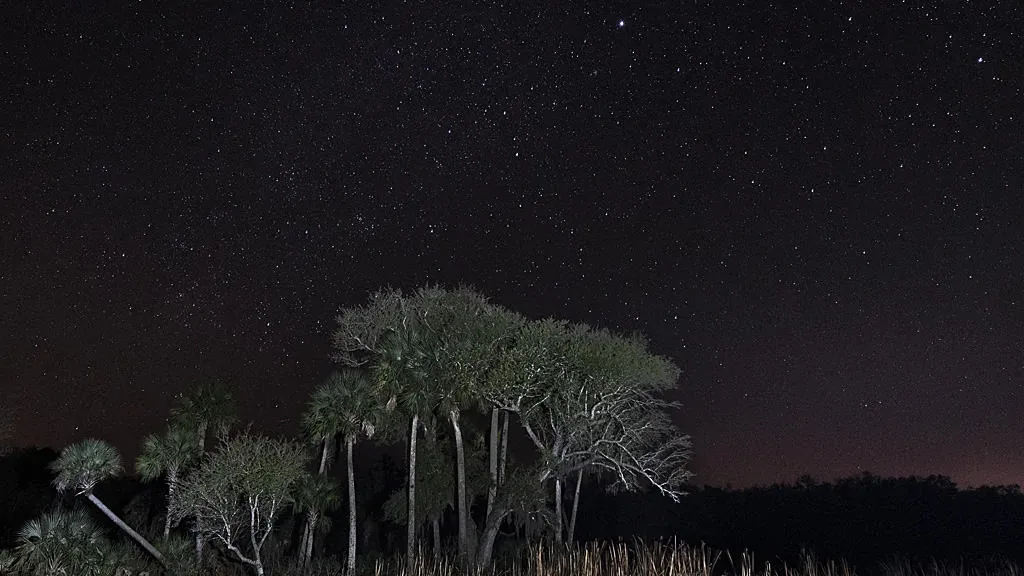
With 54,000 acres of prairie surrounded by vast cattle ranches and almost 30 miles from the nearest town, suburban light pollution does not exist, making the Kissimmee Prairie Preserve an ideal campground for stargazing.
If you’re not camping, you need a permit to enter the park after it closes at sunset. (Phone: (863) 462-5360 for details.)
Kissimmee Prairie’s three campgrounds are clustered in the middle of the park. The family campground has 16 RV/tent sites. There are 14 RV sites in the equestrian campground (with unshaded paddocks for the horses), and five astronomy pads for tent campers, known as the “red light district.”
Red lighting at your campsite is the norm in all three campgrounds, a colorful though somewhat eerie scene after nightfall.
Kissimmee Prairie Preserve was recognized as Florida’s first “Dark Sky Place” by International Dark Sky Association in 2016.
Kissimmee Prairie Preserve State Park, 33104 N.W. 192nd Ave., Okeechobee FL 34972. Phone: 863-462-5360. For campground reservations up to 11 months in advance, go to reserve.floridastateparks.org
Read more about Kissimmee Prairie Preserve State Park
Withlacoochee River Park
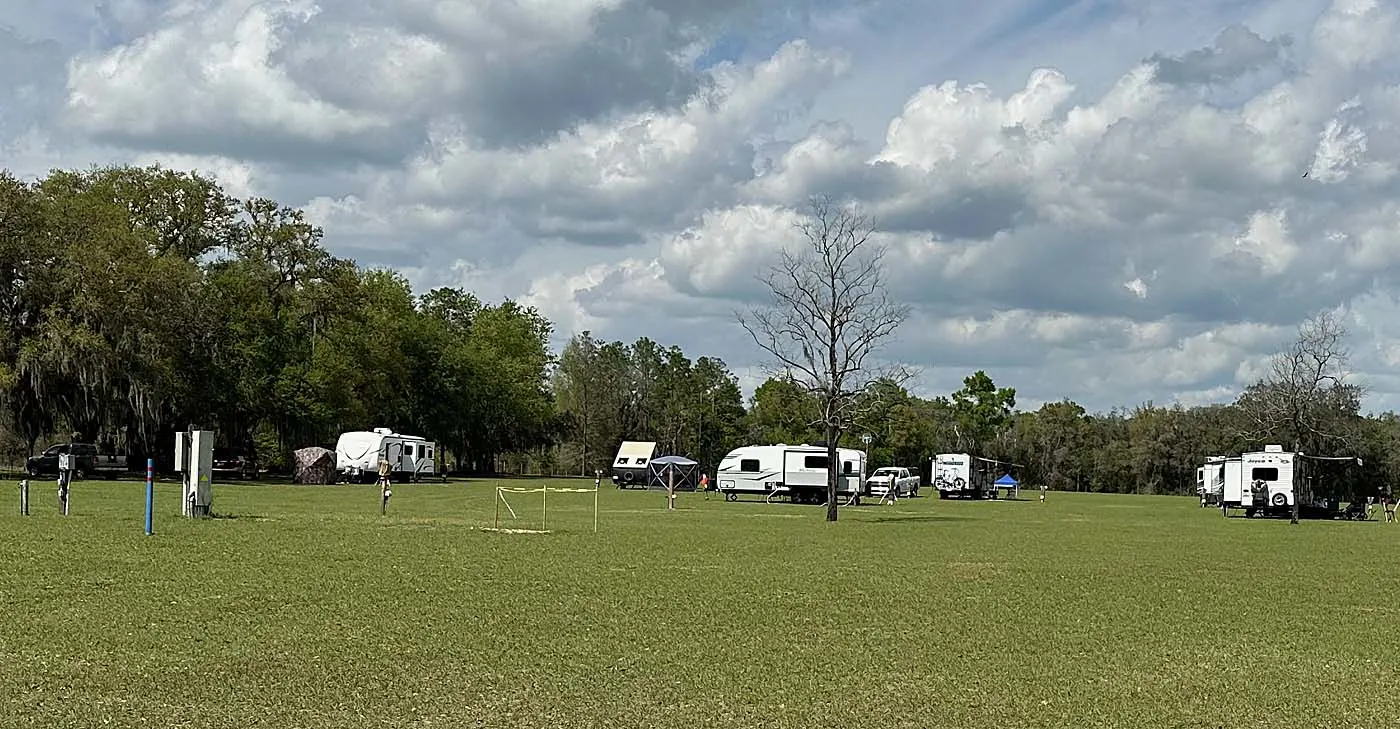
A favorite of the St. Petersburg Astronomy Club, Withlacoochee River Park is in a remote corner of Pasco County on the edge of the massive Green Swamp Wilderness Preserve, about seven miles east of Dade City.
The club reserves the park’s Activity Field on new-moon weekends, and campsites with hookups for water and 20/30-amp electric are available in the field for amateur astronomers. You do not have to be a member, and reservation are not necessary.
Non-member camping fees are $25/night with electric or $10/night without. Club members receive a discounted rate of $15/night with electric or $10/night without. Campers must display Friends-Of-The-Park Pass to be on the Activity Field.
The park’s regular campground has 15 RV sites with water and electric in the woods that you can book in advance. Nightly rate is $25. The campground also has 7 primitive tent sites without hookups for $15/night, and another 8 hike-in sites. The park also has two primitive cabins for $40 per night.
While the Activity Field has wide-open skies, the regular campground has considerable tree cover. Campers must arrive before dusk and be settled in their sites on new-moon weekends.
Editors Note: RVers should not rely on the park’s poorly designed dump station. There is no drainage for spills, and we found it unusable on a recent visit.
Withlacoochee River Park, 12449 Withlacoochee Blvd
Dade City, FL 33525-1014. Phone: 352-567-0264. You do not need a reservation on the Activity Field for new-moon weekends. To reserve a site in the campground, go to PascoCountyFL.net.
Hopkins Prairie Campground
in Ocala National Forest
An island of shady oaks amid sweeping grasslands, the Hopkins Prairie Campground is a seasonal destination for campers looking to get off the beaten path. Hopkins Prairie sits along the Florida Trail with fishing and birding along miles of prairie shoreline.
All 21 sites are well-shaded in an oak hammock surrounded by grasslands, affording most sites a view of the prairie and phenomenal views of the night sky. The campground has vault toilets and a shared hand pump for drinking water.
Hopkins Prairie Campground is open seasonally from October through June for $12 per night (cash), and no reservations are required.
Another excellent option is the Farles Prairie Recreation Area, but there’s no campground, just dispersed camping outside its perimeter. Hikers pitch tents along trails outside the recreation area, along the rim overlooking the prairie or the lake.
While Hopkins Prairies and Farles Prairie are recognized as a prime stargazing sites for amateur astronomers and photographers, you can hardly go wrong anywhere in the forest with a clear view of the sky.
Hopkins Prairie Campground, Ocala National Forest. GPS Coordinates Latitude: 29° 4′ 44.0000″ N | Longitude: 81° 34′ 48.0000″ W. The campground is managed by Adventure Ocala.
Read more about Camping in Ocala National Forest
Chiefland Astronomy Village
or Manatee Springs State Park
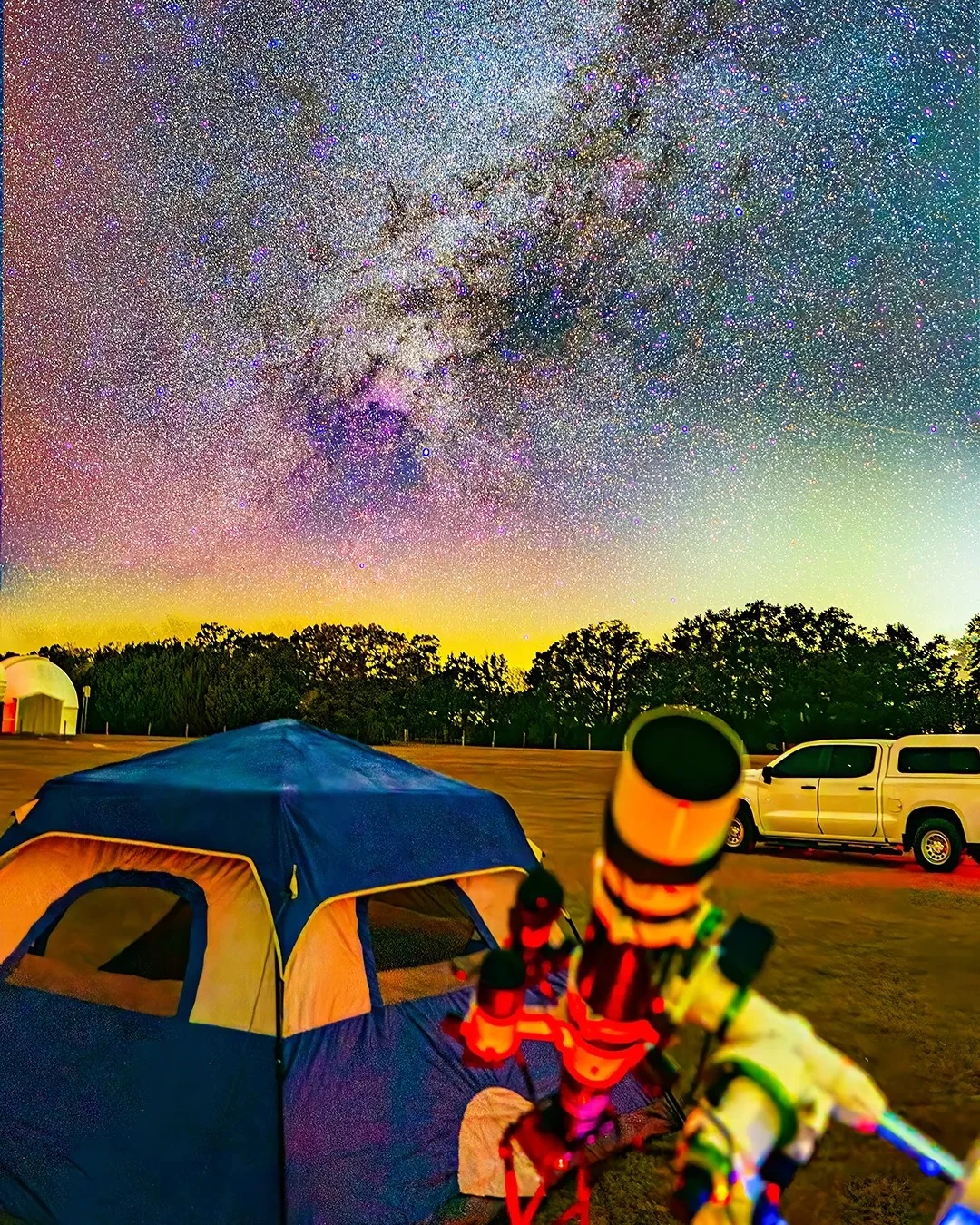
Stargazing events have long been held at the Chiefland Astronomical Village, a few miles south of Manatee Springs State Park, leading the International Dark Sky Association to encourage Manatee Springs State Park to apply for recognition as a Dark Sky Park.
Chiefland Astronomical Village is a privately owned dark-sky site in northwest Florida. The observation field is open 365 days a year to members, who pay a $30 fee for annual membership. Camping is permitted with a donation of $15 per night for tents and $30 for RV’s with a 30-amp hookup. Red lighting is mandatory when camping here.
Every month around the new moon, a three-day star party is held in the open field with a Spring Picnic on the new moon in April and Fall Astrofest on the new moon in November.
For contact information, membership and payment details, go to Google Docs.
If you’re looking for less-restrictive alternatives (red lights not required) with more recreational options, book a campsite at Manatee Springs State Park on the Suwannee River, offering kayaking and canoeing and other boating options.
Manatee Springs is 14 miles from Chiefland Astronomy Village. | Map with directions
This state park has a developed swimming area, 8.5 miles of nature trails, and a connector to the 32-mile Nature Coast State Trail for bicycles. During the cooler months, manatees can be seen snuggling up to the spring run.
Manatee Springs State Park has 80 woodsy, well-spaced campsites, some just for tent campers, some for RVs, with electric and water at each site. Sites are
Chiefland Astronomy Village, 5310 NW 52 Ct, Chiefland, FL 32626. Contact: [email protected]
Manatee Springs State Park, 11650 N.W. 115 St., Chiefland FL 32626. Phone: (352) 493-6072. Camping fee: $20 per night plus $7 daily utility fee and a one-time booking fee of $6.70. Reservations accepted up to 11 months in advance for Florida residents and 10 months in advance for non-residents at reserve.floridastateparks.org
Read more about Manatee Springs and nearby Fanning Springs
Interactive Moon Phases. This link will take you to www.timeanddate.com/moon/phases/ where you will see charts of moon phases for your location (the default). You will also have an option to enter other locations.
North Florida
St. George Island State Park
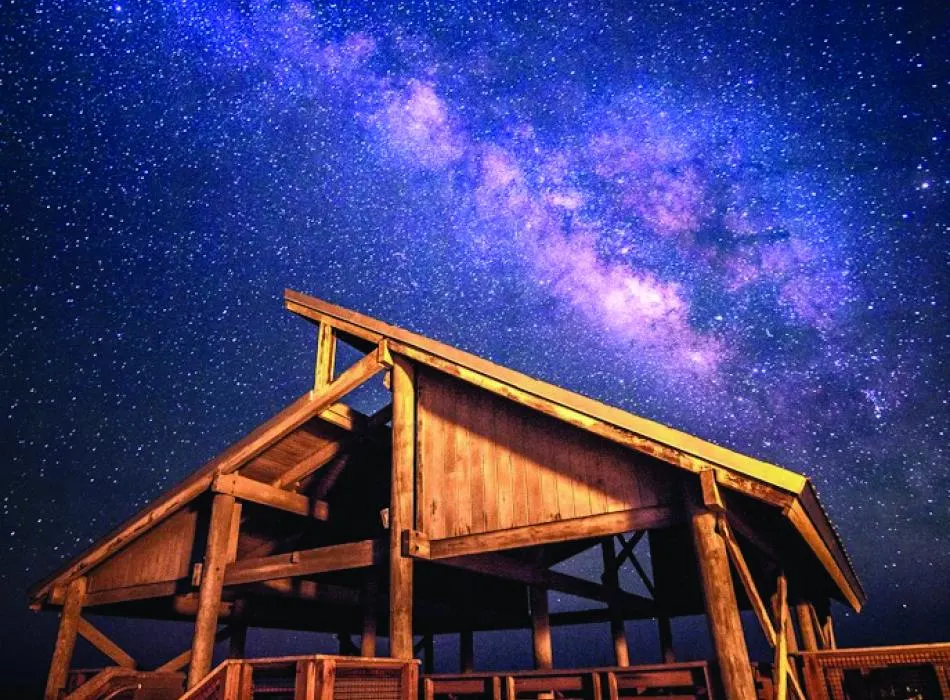
St. George Island is a barrier island off Apalachicola Bay, and the campground at St. George Island State Park is all the way at the island’s eastern end, a healthy distance from the island’s population and off a barren coast.
No lights here, except the campfires, and you can get away from them by crossing the dunes to the beach, where the heavens shine with abandon after sunset.
“The park offers the best viewing of the night sky in the region,” according to the park’s web site, “and staff are working toward a designation as a Dark Sky park with the International Dark Sky Association.”
An observation platform built by volunteers is perfect for stargazing, but you can find a good spot almost anywhere on this pristine, dune-wrapped beach.
The campground has 60 sites with water and 50-amp electric. Max trailer length is 43 feet.
St. George Island State Park, 1900 E. Gulf Beach Drive, St. George Island FL 32328. Phone: 850-927-2111. Camping fee is $24 plus a daily $7 utility fee and a one-time $6.70 booking fee. Book campground reservations online up to 11 months in advance for Florida residents and 10 months in advance for non-residents at reserve.floridastateparks.org
Read more about St. George Island and Apalahicola
Ochlockonee River State Park
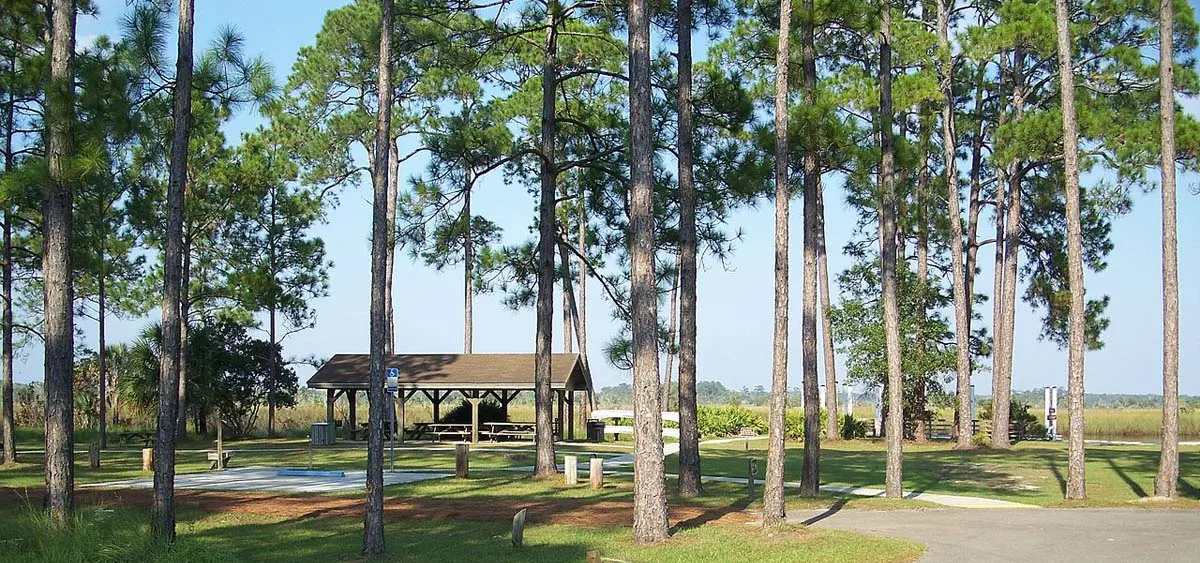
Isolated by surrounding forests and significant wildlife refuges, Ochlockonee River State Park anchors the middle of a desolate wilderness corner of the Panhandle free of light pollution, about 45 miles south of Tallahassee.
Buffered against civilization by Apalachicola National Forest, the St. Marks National Wildlife Refuge and Tate’s Hell State Forest, Ochlockonee not only offers the ideal night sky for stargazing, but it’s also a magnet for migrating wildlife.
Recreation opportunities include camping, boating and fishing, kayak and canoe trails, bicycling and hiking on multi-use trails. It’s also a notable birding destination.
The campground has 30 sites with 50-amp electric, water hookups, fire ring, picnic table and clothesline. No sewer hookups, but a dump station is nearby, along with restrooms with hot showers, an outside sink for washing dishes, and water fountains.
Ochlockonee River State Park, 429 State Park Road, Sopchoppy FL 32358. Camping fee: $18 plus a $7 daily utility fee, taxes and a one-time $6.70 booking charge. Reservations: Florida residents can book sites up to 11 months in advance, non-residents up to 10 months in advance, at reserve.floridastateparks.org or call 800-326-3521.
Related Story: St. Marks National Wildlife Refuge
Torreya State Park
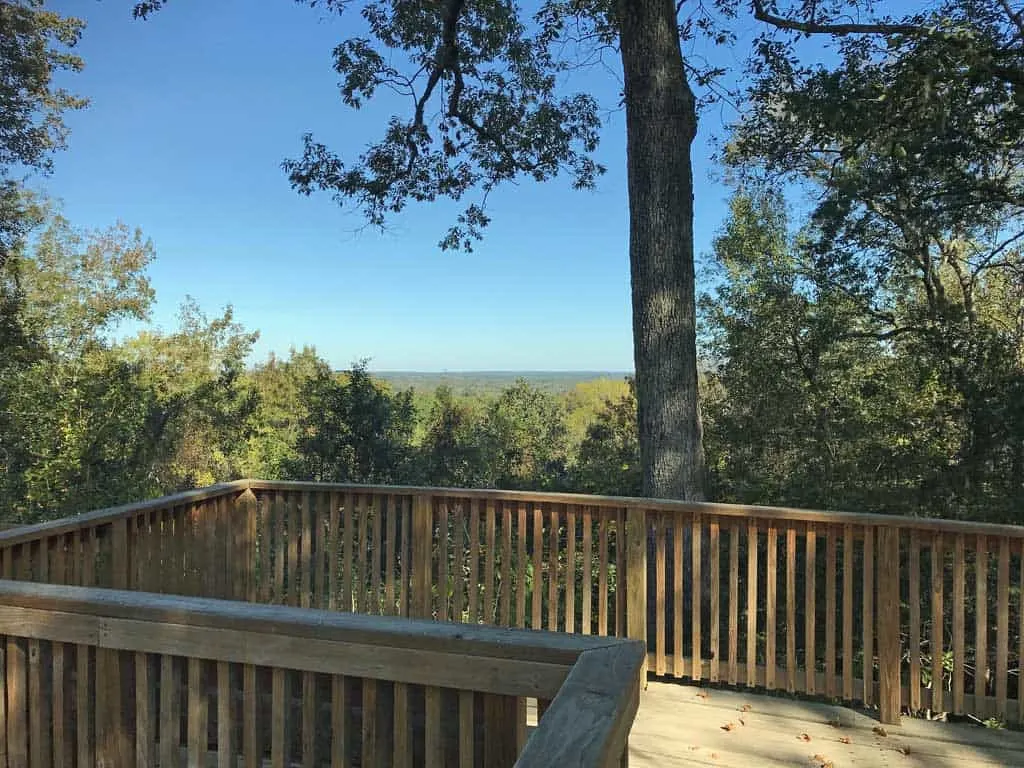
Your campsite is closer to the sky at Torreya State Park, where the campground rises on a high bluff above the Apalachicola River, a seemingly endless view in the daytime, and a grand stage for the northern sky at night.
I felt like I was in another place and time when I camped there.
An added bonus, you are in what some say is the real Garden of Eden. Other legends have it where the world’s wildlife boarded Noah’s Ark. Or you can just chalk all that talk up to Florida Tourism.
Any way you cut it, Torreya State Park is a premier destination for stargazers. The nearest town of any consequence is Bristol, population 845, about 14 miles away. Most everything else around the park’s bluff is dense forest.
The park’s 29 campsites are well-suited for both tents and recreation vehicles with full hookups, and there’s a yurt available for nightly rentals of $40.
Torreya State Park, 2576 N.W. Torreya Park Road, Bristol FL 32321. Phone: 850-643-2674. Camping fee: $16 per night plus a daily $7 utility fee, taxes and a one-time reservation fee of $6.70. Book your campground reservations up to 11 months in advance for Florida residents, 10 months for non-residents, at reserve.floridastateparks.org. Or call 800-326-3521.
Read more about Torreya State Park
Florida’s Big Bend
Shell Mound Campground & Boat Ramp
Levy County
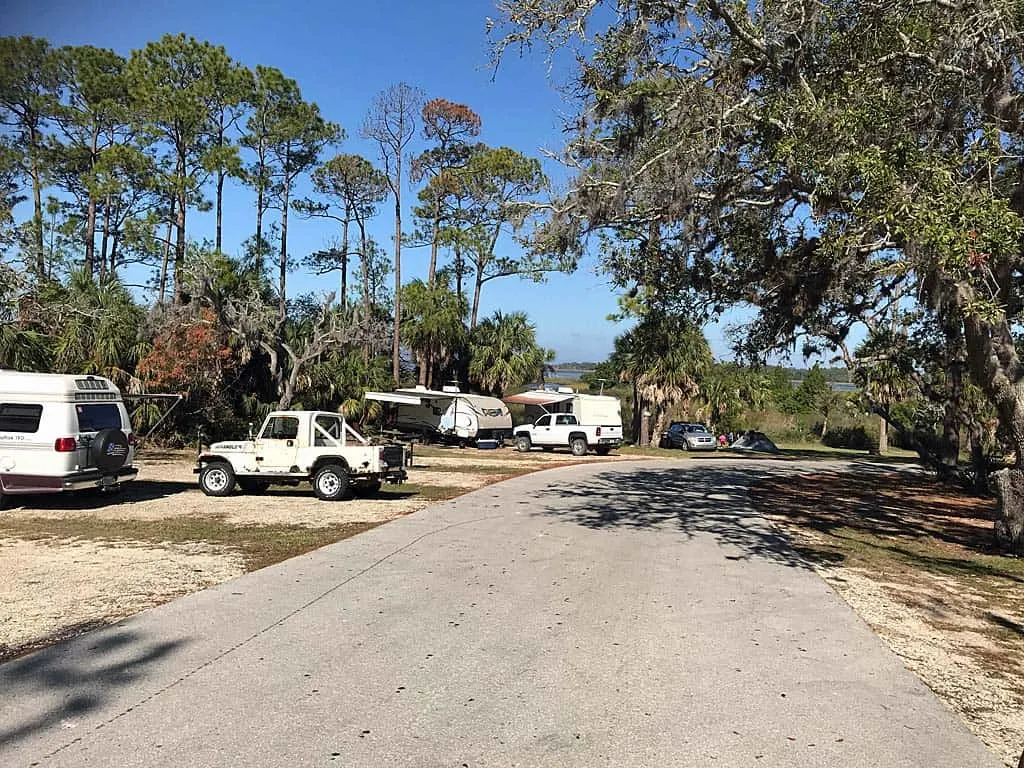
The Shell Mound Boat Ramp is in a remote corner of Levy County, overlooking desolate and very dark Suwannee Bay.
There is literally nothing nearby that would cause light pollution.
Campers there are most likely anglers, but the new moon is not prime time for fishing, so you will probably only encounter fellow stargazers.
Should you get a high tide during a new moon, you can kayak out from the boat ramp for a clearer view of the night sky. Just don’t get lost in the flats of the bay. Low tide is a bit risky, given the frequent shoals and shallow waters on the flats.
Shell Mound Campground, 17650 SW 78th Place, Cedar Key, FL 32625. Phone: (352) 221-4466. Camping fees: Water and electric sites for two people are $25, electric-only sites are $20 and tent sites are $10, including tax. Cash only. No reservations. Cedar Key is the closest town, about 9 miles.
Related story: Shell Mound and other camping near Cedar Key
Shired Island Campground
Dixie County
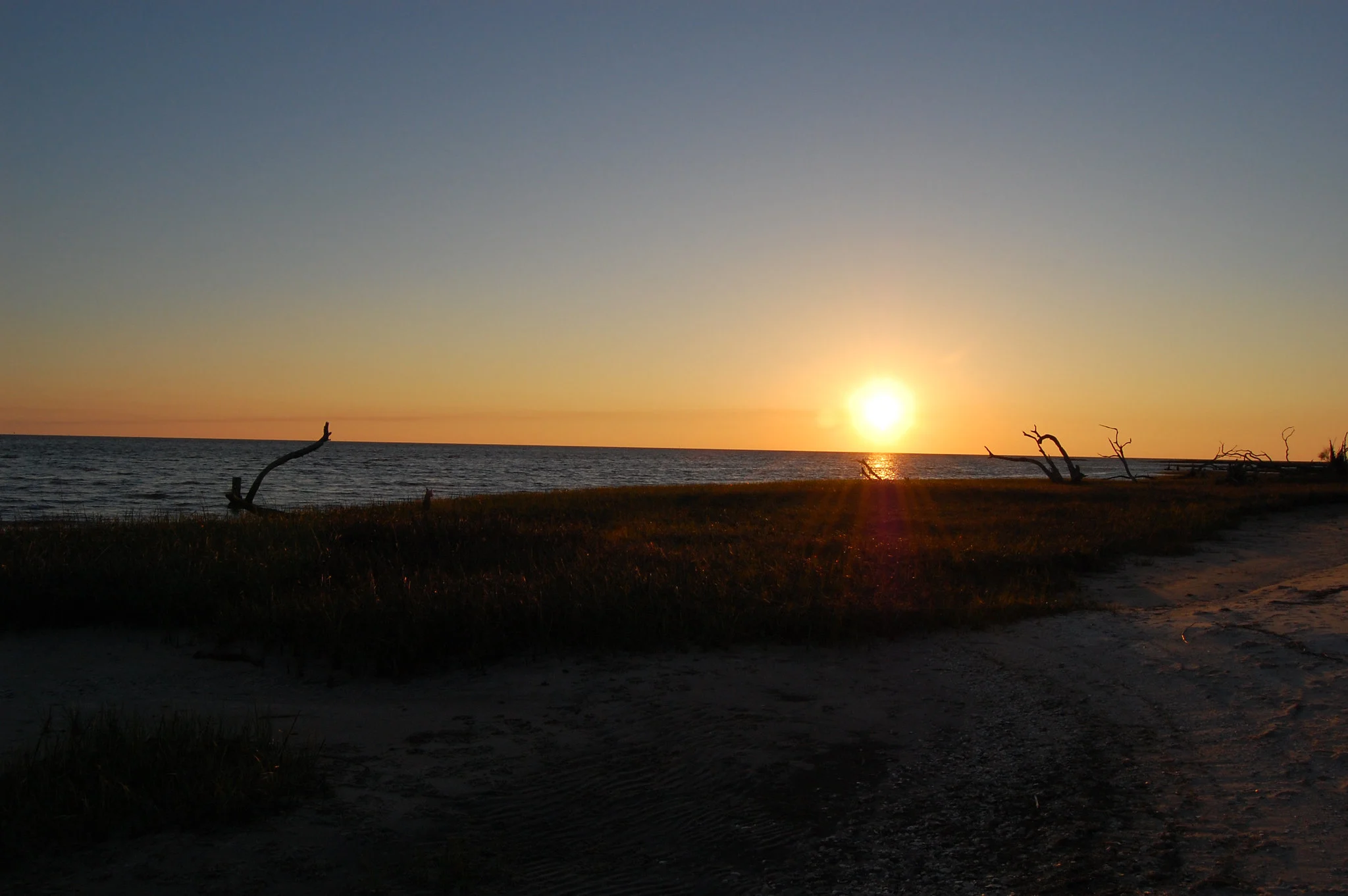
Another favorite for dark sky enthusiasts, Shired Island, is deep in the isolated saltwater marshes of Lower Suwannee National Wildlife Refuge on Florida’s Big Bend.
A short hike away from the campground or paddle off-shore offers the best views of the night sky.
The campground offers 12 hookup spots for RV’ers, with or without electricity, first come, first served. Tent campers are welcome.
Weekdays are best. The local party crowd takes over the park on weekends for backcountry carousing.
Shired Island Park Campground, 21354 County Rd 349, Old Town, FL 32680. No reservations. An employee of the parks department comes around to collect the $20 camping fee in the morning.
South Florida
Big Cypress National Preserve
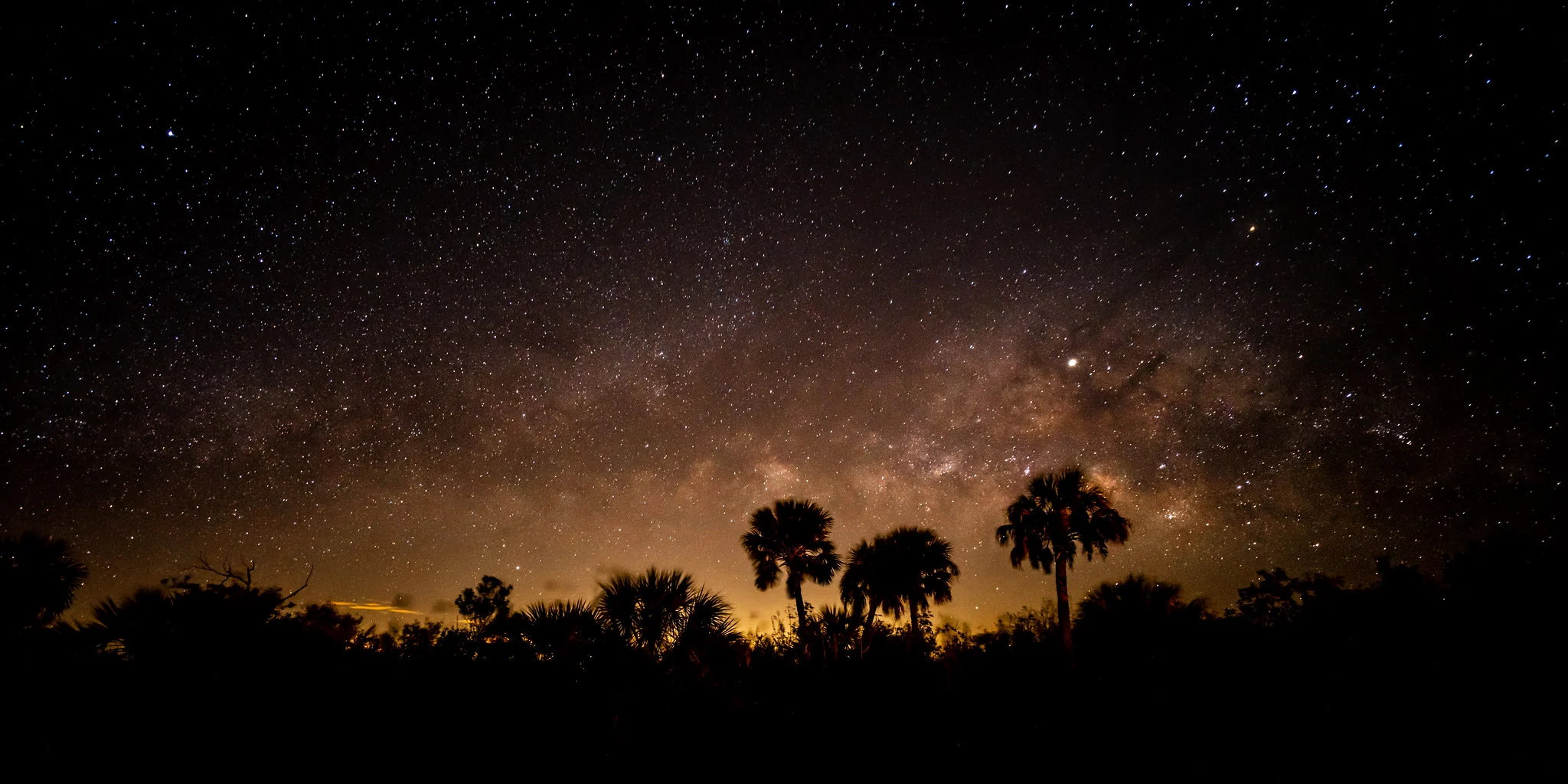
Big Cypress National Preserve is a wilderness. Arguably, any of its 5 campgrounds are ideal for experiencing dark skies on the new moon.
“The Preserve is bordered by the wet freshwater prairie of Everglades National Park to the south, and other federal and State of Florida lands to the west,” the association notes in its designation.
The two campgrounds I recommend for the best stargazing are Midway (open all year) and Burns Lake (seasonal).
Midway Campground. (Open all year) The Midway Campground is the most developed Big Cypress campground with water, electric hookups and restrooms. The 26 RV sites with electric are $30/night, and the 10 tent sites are $24/night. Midway is 3 miles from the visitor center, where stargazing events are held monthly from December until March.
Burns Lake Campground (Seasonal). Burns Lake has 10 RV and five tent sites,. The campground is only open from Aug. 15 until April 15. There are no electric hookups (no lights) and no water, so bring your own everything. The sites are out in the open with plenty of separation, making it an ideal bivouac for stargazing. Burns Lake is 13 miles from the visitor center.
From December until March, park rangers host monthly Starpark events at the Kirby Storter Nathaniel P. Reed Visitor Center, southern end of Seagrape Drive, east of SR 29 between MM 73 and 74 on US 41.
Related Story: Camping in the Big Cypress National Preserve
Dry Tortugas National Park
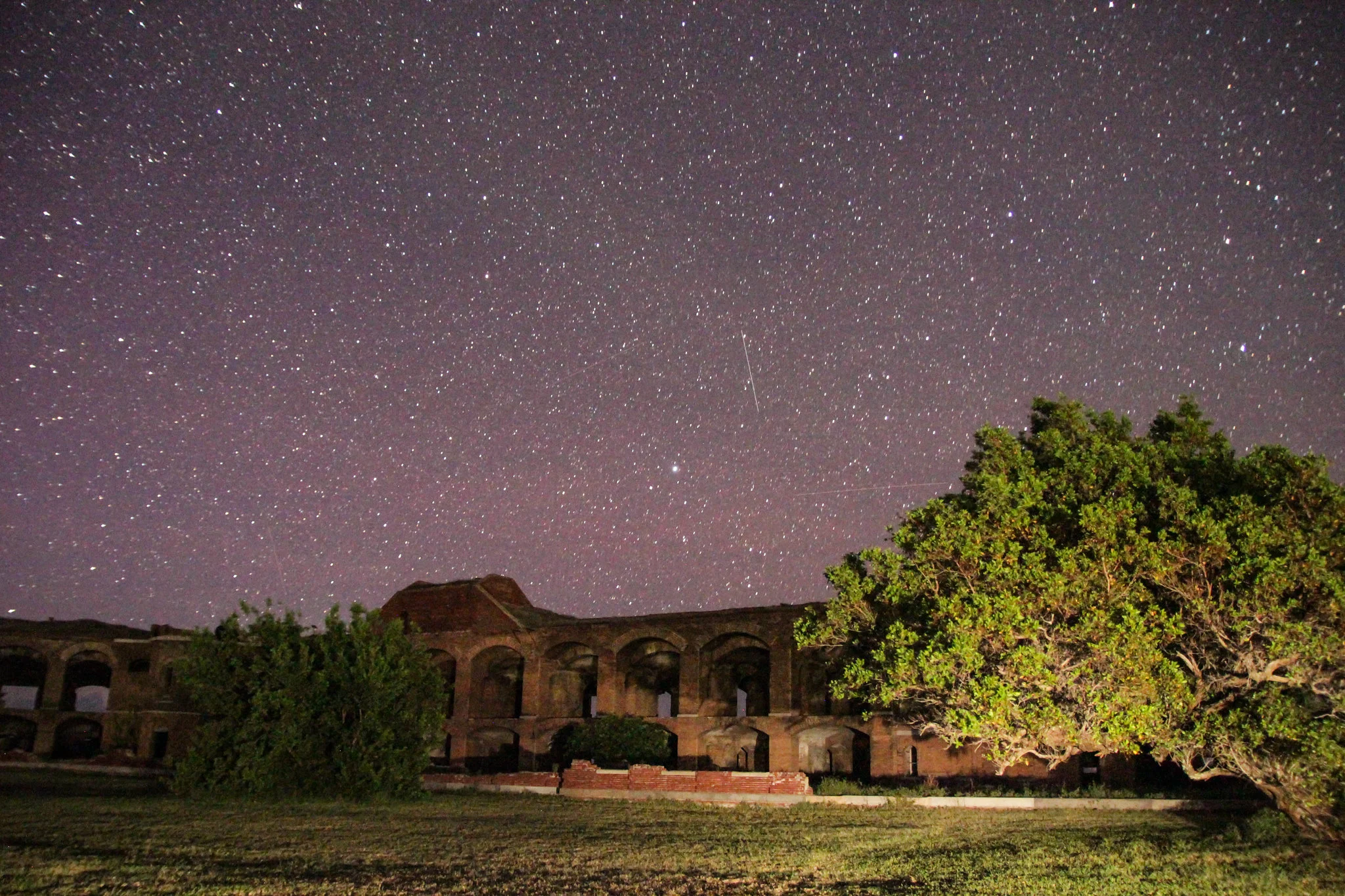
The skies don’t get much darker in Florida than the Dry Tortugas, a remote island 70 miles west of Key West.
Getting out there for an overnight camp could be a challenge, though. The trick is nailing a reservation for the 2 1/2-hour ferry ride aboard the Yankee Freedom, which stays booked well in advance.
Your best bet is to check the ferry’s availability calendar frequently for cancellations. We found occasional one-night openings, but none lined up with the new moon calendar.
That’s not to say the skies don’t sparkle outside the new moon.
The fare for the ferry is $220 round trip ($240 if you bring a kayak) and includes park admission but not the $15 nightly camping fee, which you pay in cash when you arrive. You must bring everything with you, including water, and you have to carry out everything you bring.
For details, visit Dry Tortugas National Park web site.
Read more about Camping at the Dry Tortugas National Park
Stargazing like a Pro (Video)
Helpful Hints: Red Light Camping
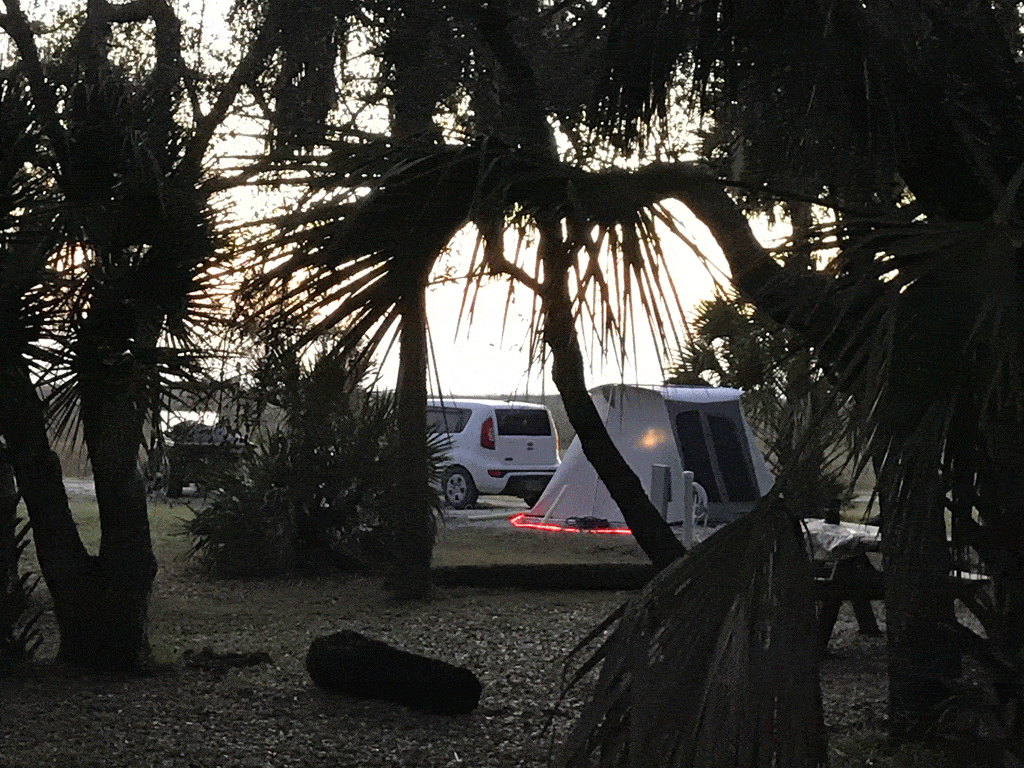
In order to see faint stars, our eyes needs to adapt to darkness, and white light interferes with your night sight. Red lighting preserves night vision and complements night-sky photography.
Amateur astronomers use red lighting at their campsites and on astronomy pads to mitigate light pollution, leaving enough light to see without disrupting the experience.
Wildlife observation is another benefit of red lighting because it doesn’t alarm animals.
As a courtesy to others and to enhance your own stargazing experience, especially in the days before and after a new moon, add red lighting to your camping gear.
Dark Sky behavior Don’t roll up to a star party or dark-sky park with your headlights on and radio blaring. Arrive before dusk and quietly to set up your gear. Camp there if you can — with red lighting in your gear box.
Astronomy-friendly gear from Amazon
- Fazekas, Andrew (Author)
- English (Publication Language)
- 288 Pages – 03/19/2019 (Publication Date) – National Geographic (Publisher)
- Amazon Kindle Edition
- Carter, Jamie (Author)
- English (Publication Language)
- Multiple Light Modes – White LED, Red LED
- Night vision preserving mode extends run time for emergency preparedness
- Incorporated D rings on top and bottom of lantern to hang it in either inverted or upright positions
- AWESOME DÉCOR LIGHTS: These red rope lights contain 108 SMD 3528 LEDs, 1.8in spaced. The crystal-clear PVC jacket ensures the most…
- WATERPROOF FOR OUTDOOR USE: The thick PVC jacket enables it to withstand extreme external environment (rain, snow, squeezing, collision…
- FLEXIBLE AND CONNECTABLE: The flexible rope lights are easy to bend or twine. They can be end-to-end connected up to 12 strands. The total…
Note: Product links go to Amazon. If you make a purchase by following the above links, Florida Rambler may receive a modest commission, which helps support our mission to bring you quality content about outdoor recreation in Florida.
Related story
For an out-of-this-world experience, you might want to try tent camping on dozens of starlit islands in Florida.
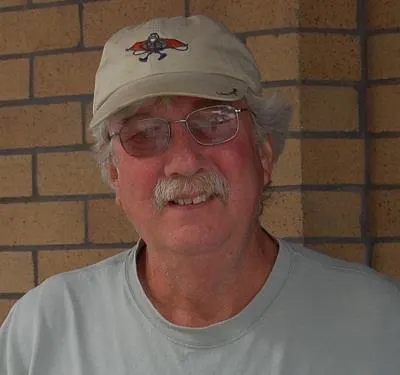
Bob Rountree is a beach bum, angler and camper who has explored Florida for decades. No adventure is complete without a scenic paddle trail or unpaved road to nowhere. Bob co-founded FloridaRambler.com with fellow journalist Bonnie Gross 14 years ago.




